When Spain Lost Power, People Found Theirs Again - Undividing #24
The systems failed—the people didn't.
Welcome to Undividing where we are reconnecting a divided world
Hey there everyone,
Firstly, I want to tell you something about my book, How To Burn A Rainbow. It’s being reviewed at the moment for two auspicious prizes at the LAMDA Literary Awards—best Gay Memoir, and Outstanding First Time Author. They announce early July… I’ll keep you updated.
And I also created a page here for it here on my Substack ← Check it out. You can read the story about how it came together, the tour, who I met along the way, and what that book is doing for people who aren’t in the LGBTQ+ community and not getting divorces. It’s become the universal tale I always hoped it would.
Yes, that’s me and
of Eat Pray Love fame who I met along the way. And yes, that’s her copy that she took with her… she is as lovely as you think she will be, what a human!And now onto this week’s Undividing…
I couldn’t stop reading the stories about Spain and Portugal when the electricity grid went out. At first, I was in a panic; was this a cyber attack? But then as it became clear it was a tech fault and how the governments were mobilising to handle it, I found myself more intrigued by the people.
The stories of how folks came together blew me away. And I wanted to share my thoughts on how when these countries lost power, the people found they had all the power in the world. They undivided themselves in the darkness and the analog.
I posted a Note about this last week, and naturally got some stories of the terrible things that happened and could happen; lives were lost, infrastructure ground to halt, and, had it gone on for days, the chaos that might have ensued when people start running out of food and water.
I don’t mean to ignore or trivialise any of those things. Or ignore that everyone cheered when the electricity came back on again. But let’s not forget the insight into all of us that came from ten hours without power. And remind ourselves of the best of us and the good we are not only capable of, but that we are craving.
Let’s get undividing!
Spain and Portugal go dark
On 28th April I was having a late breakfast, putting the final touches on my last Undividing and thinking about my day ahead, when I heard a ping on my phone.
I’ve been trying to figure out how to turn the notifications off on a news app I have, I swear I’ve changed it three times but somehow, they come through. Annoyed at the interruption to my writing, I go to turn my phone off when I see the alert. It read like one of those cold matter-of-fact sentences that sounds like the beginning of a dystopian novel: “Massive power outage sweeps across Spain and Portugal.”
No reason yet. And that felt worse… the not knowing why.
First thing I wondered was if my friend Jorge was OK in Madrid. I texted him. One tick—it hadn’t gone through on his side. Does the city have no wifi? I haven’t had a landline in 20 years, I realised. Do landlines even work in blackouts, I wondered.

I googled it. Oh no, I thought, this isn’t a neighbourhood or two that the news app is overplaying the drama of for clicks, this is the whole country. Countries. Lisbon and the cities and countryside of Portugal were dark too.
The worst had happened; trains stopped mid-journey, traffic lights failed, and communication networks collapsed. Hospitals kicked their backup generators to life but millions were left without electricity for hours, and people had their cell phones out—not for entertainment, but for light.
Of course, my first thought was that it was some kind of covert cyber attack. I wondered what Germany’s grid was like and how exposed we were.
Little did any of us realize that something else was about to happen. Something unclickable, un data-fiable, un-monetizable. What unfolded wasn’t dystopia. It was something closer to a miracle.
Now I know a lot of bad things happened that day; people were trapped, airports were a disaster all over Europe, many felt literally powerless. Three people lost their lives. So I don’t want to make out that there was not a havoc and sadness. And it also points out the fragility of the systems we’ve come to rely on.
But when the lights went out, for most folks something human switched back on.
The cities stopped. The people started.
I’ve had moments like this in LA, when there was an earthquake or a tremor, suddenly we would all be outside. And introducing ourselves to our neighbours. But the tremors never lasted long and neither did our short lived camaraderie.
Give it 20 minutes and we’re all back in our boxes. I’m sure the folks there thought the same thing, but instead it stretched on for a whole day. So they made more than the most of it.
In Barcelona’s Gràcia neighbourhood people emerged from their apartments. Neighbors who had never spoken sat on stoops together. An older couple brought their old wind up radio out onto the street and broadcast updates—this relic was suddenly a shared lifeline of news.
A man rolled out a chess board and set it up on a recycling bin and folks started sitting down to play. People passed around cold beers before they could get warm. Others brought out guitars.
People started gathering in public squares to sunbathe, read, and play games. With no screens and very little news to share, people started sharing stories and laughter.
In Barcelona, the top-ranked restaurant in the world, Disfrutar, kept serving guests by candlelight, cooking with camping stoves and asking for IOUs via bank transfer later. In a world of QR codes and automation, it was replaced in an instant by goodwill.
Other restaurants along the water lit candles and started cooking what they could before the food spoiled. A traveling violinist from Poland played next to a street magician from Mozambique. Tourists and locals danced barefoot in the square like the city was hosting an unexpected wedding.
Check out these neighbours who decided to have lunch in the middle of the street:
 Tiktok failed to load.
Tiktok failed to load.Enable 3rd party cookies or use another browser
In Madrid, there were the same kinds of scenes. The absence of all our usual distractions led to spontaneous flamenco performances in Sevilla and impromptu street games across cities.
I heard from a friend that great migrations started all over her city. She had to walk an hour and half to get home from her office, but joined the marathon of folks who were doing the same thing. People were doubling strangers on their bikes. Older folks were sitting in shopping carts and on pallets on wheels being pushed by younger ones in impromptu taxi services.
Everyone was laughing, talking, helping each other, sharing water and food. She marvelled at the fact that she recognised people from her regular commute to work. And on any normal day, they would have just been sitting next to each other oblivious and on their phones.
A tech conference in Porto switched it up by taking all its panels to an outdoor courtyard. They scrapped the PowerPoint decks, formed circles of chairs, and talked like it was 1999.
Yes, there was panic buying in all the supermarkets too. No one knew how long this was going to last. But I also read a story of people making sure others had rice, flashlights, and other necessities. People wanted what they needed but also that the strangers they were with had enough too.
In the moment where you would think that everything was going to feel broken, it seems that all it felt to anyone there, was alive, connected, and most of all, relieved.
One woman interviewed by the Guardian said it best, “We were shipwrecked in our own lives, and suddenly we remembered how to swim together.”
I want to be in the dark too
One story that stuck with me came from a small village north of Évora. With no streetlights or cell towers, dozens of families pulled their mattresses onto the grass and slept under the stars together. One elderly man said it was the first time in 40 years he’d seen the Milky Way. His granddaughter said she thought it was fake, like something from a screen saver.
No one posted it on Instagram.
No one could.
Across the entire Iberian peninsula, for one day it didn’t matter how much money you had in the bank, you couldn’t draw it out anyway.
All I could think about as I read these stories throughout the day was this; I wished I was there. I wished I had no access to the internet, emails, and notifications. I wished no company could find me. I wished to be released from all the meetings and calls I had in the afternoon.
I wished to be me, with all the other people being themselves.
Normally when you read about disasters you send off a silent prayer that you and the people that you love were nowhere near it. But not this time.
It felt so damn good because life feels so damn wrong
Three things about this came clearly to me in the days during last week.
The first was that people weren’t just coping. They were exhaling. Liberated. Lighter. It was like two countries got the day off and turned it into a party.
The second thing was this; it was the speed. The lack of hesitation with which people returned to being… people.
And it’s here that I think the biggest story is—everyone couldn’t wait to be free. Which means that everyone was feeling imprisoned by the life that we all find ourselves living in 2025.
Because when everything stopped—emails, appointments, traffic, alerts—we got to stop too. Not out of choice, but out of mercy.
Mercy to ourselves.
It’s a strange kind of joy, no? To have something taken away and feel more whole because of it. If there is a word for this in any language that you know of, please let us all know in the comments.
Because this was the feeling I had when I got divorced, lost my job, and lost all my money. When I went from living in the LA Hills with “the life” and then a few months later, sleeping on an air mattress in a former squat in Berlin with no job, no visas, no end of my divorce in sight, and no cash in the bank.
I was free in a way that I hadn’t been in I couldn’t remember how long. I wasn’t losing any race. I wasn’t even in one anymore.
I felt like I should have been a lot more devastated than I was. But after I got over the whiplash and the shock, I felt a small ember of happiness burning in me for the first time in a long time.
Because this was the third thing I realised… let’s be honest; a lot of us secretly hate the burden of our lives these days. Not our lives themselves, but the infrastructure of modern obligation. The pinging, the sorting, the scrolling, the chatbot customer support. The tyranny of the inbox and the commute and the thousand little digital obligations we agreed to without ever saying yes. The endless adulting. Busy, burned out, and getting nothing done.
Modern life feels like being invisible and guilty at the same time. And paying for the honour.

The blackout gave everyone in it something rare. An excuse to not hustle. But to simply, be.
To sit down with a neighbor without looking like you’re wasting time. To talk without checking your watch. To eat without posting your food like an offering to the Instagram Gods. To be offline without guilt.
To remember that presence isn’t a luxury. It’s our default setting. But this world makes us forget, because there’s no profit in that.
If it takes a blackout to remind us how much we need each other, then maybe the real crisis isn’t the electricity. Maybe it’s how much of our daily life runs on isolation disguised as connection. Busyness disguised as productivity.
How do we keep the lights off? Even just a little…
Of course, we need power. You can’t run a hospital or a supermarket on vibes. But what the blackout showed was that we don’t need to live every moment plugged into a machine that never lets us pause. What’s more, we don’t want to.
So what do we do now? I think it’s to intentionally choose our blackouts.
Not forever. But for an hour a day. One evening a week. If you follow my notes, I do Screenless Sundays. It’s a challenge, but if you prep before and warn people, it’s an amazing way to feel free once a week.
Power-down Pot Lucks - A monthly night where the phones go off, the candles come on, and you invite friends over to share a night of no electricity and just people turned on instead.
Board Games - I once went to a barbecue in LA and someone brought a 500 piece puzzle. Who’s going to want to do that I thought? Everyone. We were a team of folks laughing and chatting and solving it together.
Powerless brainstorm - Taking a note from the Porto conference above. No decks, no screens. Just pens, paper, and voices. Who knows what we will come up with in the sunshine with no mute buttons.
Talk to stangers - Next time you reach for your phone to google, don’t. Look around. Is someone nearby? Could you ask them where it is? And maybe how they’re doing?
I started a discussion thread asking when was a time you felt truly free. Click here to add your thoughts to it.
A Lesson in Unity
The world is divided in so many ways. Politically. Racially. Digitally. Economically. But for a few hours, Spain and Portugal reminded us: when the systems fail, we don’t have to.
We can still gather. We can still share. We can still remember that underneath all the noise, we still belong to each other.
Not only can we, they showed us that we’re desperate to be with each other.
The blackout revealed the fragility of our modern infrastructure, but the strength of regular folks. In the absence of electric power, people found theirs again and fast. And that even in the dark, we bridge the divides that separate us.
How can you support Undividing?
Like, comment and restack! It all helps the algo push Undividing into people’s feeds.
Have you learned anything in Undividing that’s helped you in your life? Given you a new perspective? Helped you feel connected to the good in all of us? If so, consider taking out a paid subscription. If we can get to a 100 paid subscribers, the algo will supercharge Undividing and get that feeling you’ve had to more people here.
Plus I’m going to start adding paid tiers to Undividing. I’m not paywalling what I already offer. But I am going to start live videos and other offerings for paid levels. More to come on that…
You can also Buy Me A Coffee. I post you back a personal 30 sec video for any donation, any size. (Ignore the BMAC amount prompts, you can enter any amount)
You can also support by picking up a copy of my award-winning book How To Burn A Rainbow, the story of how my divorce set me off on a journey - a riches to rags rollercoaster from LA to Berlin where I had to lose it all to find myself.
And that brings us to the end of Undividing #24.
Till Thursday when we do the next Emotions Diary, let’s move through this world undividing, and see what this planet can do.
Karl



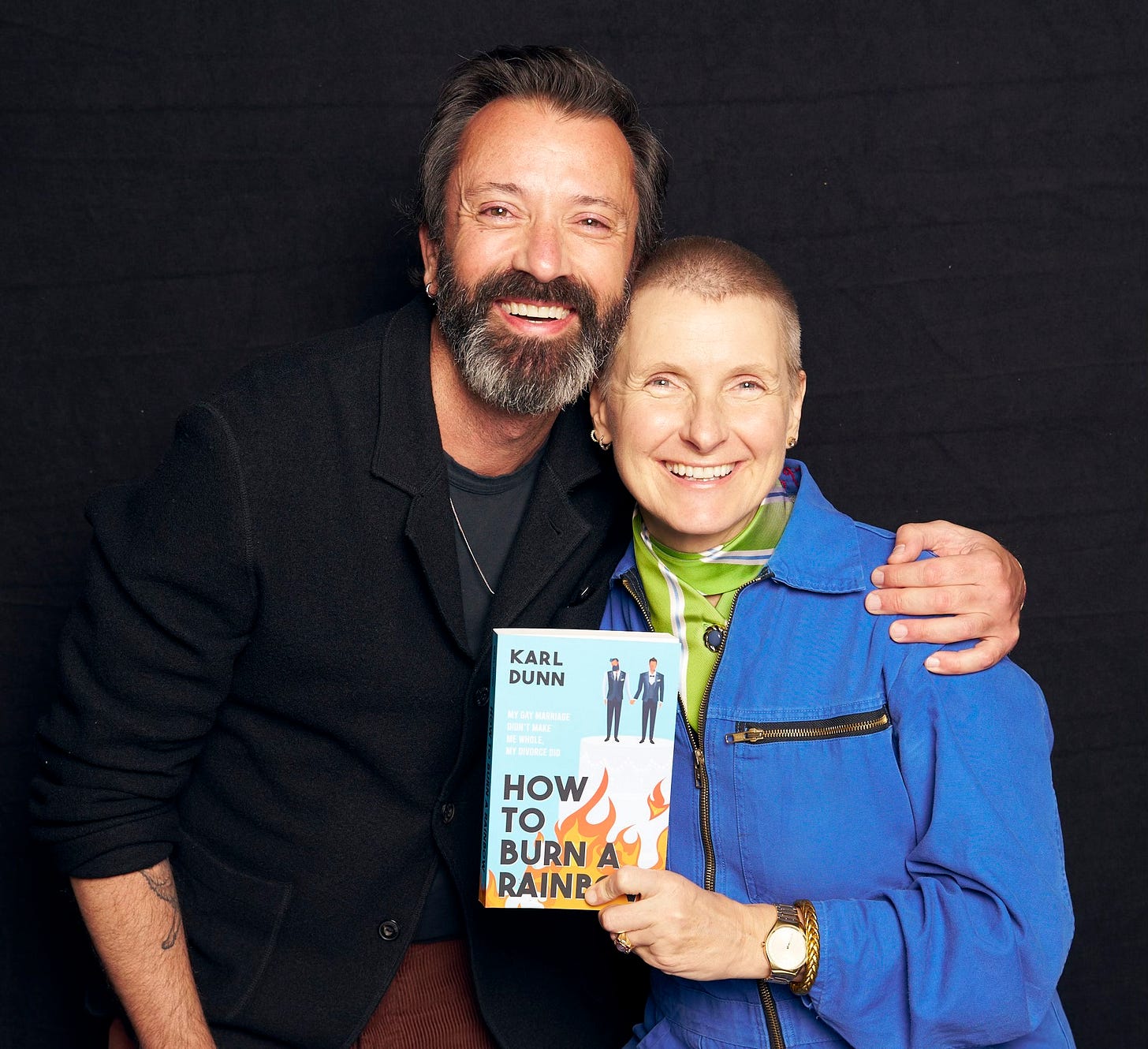
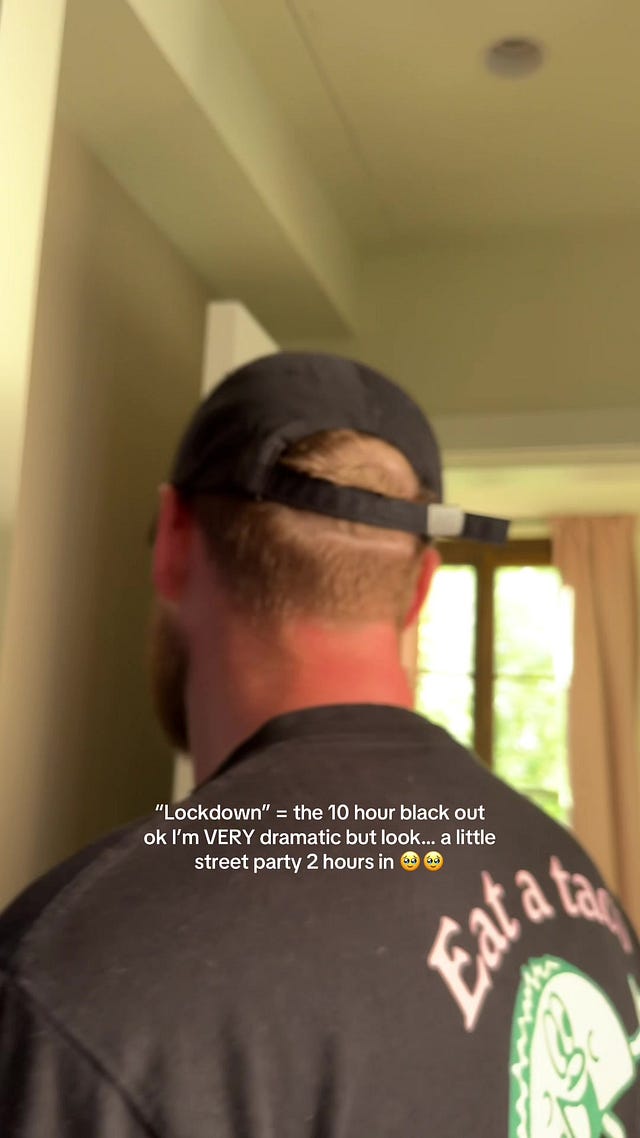
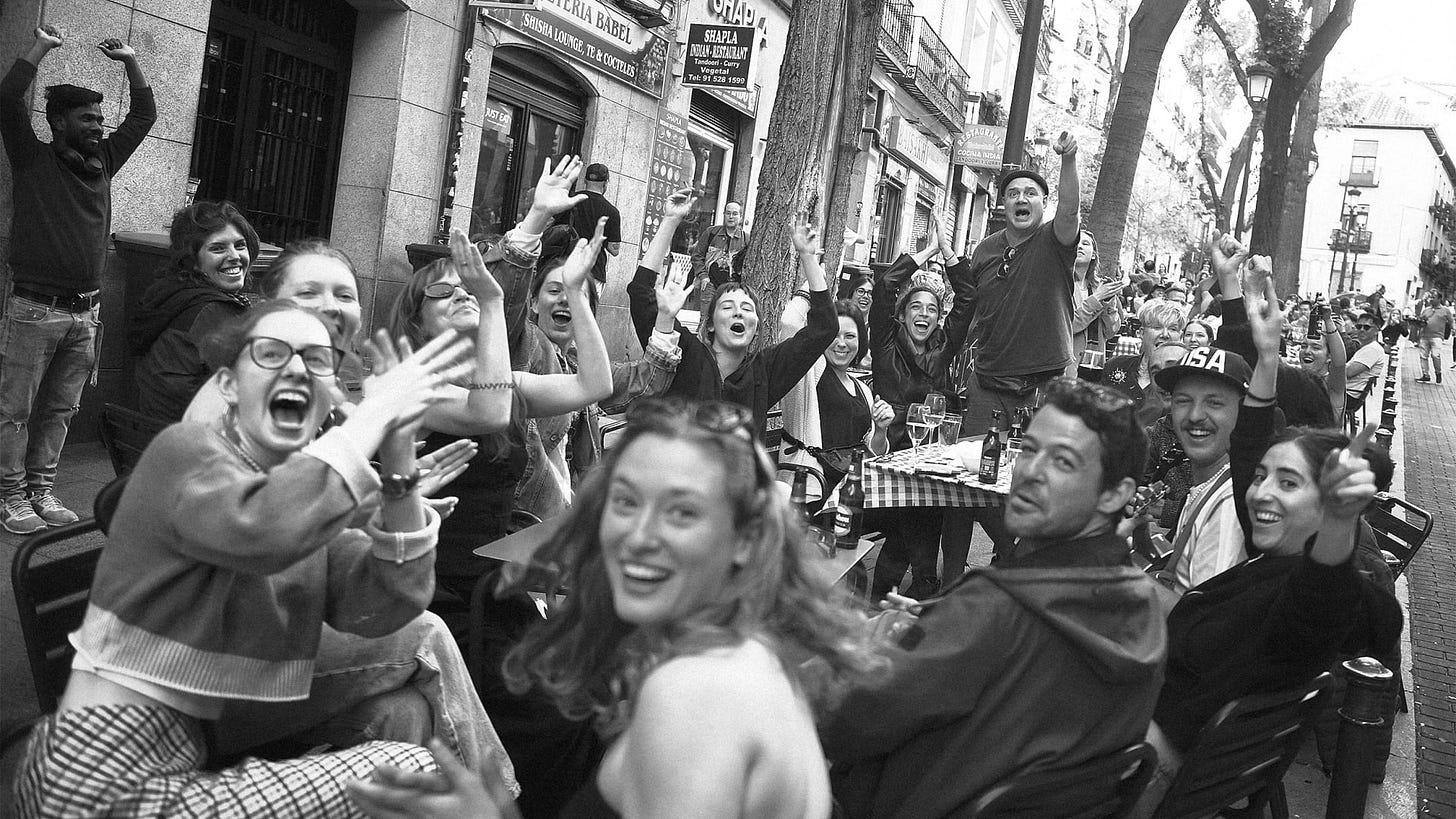
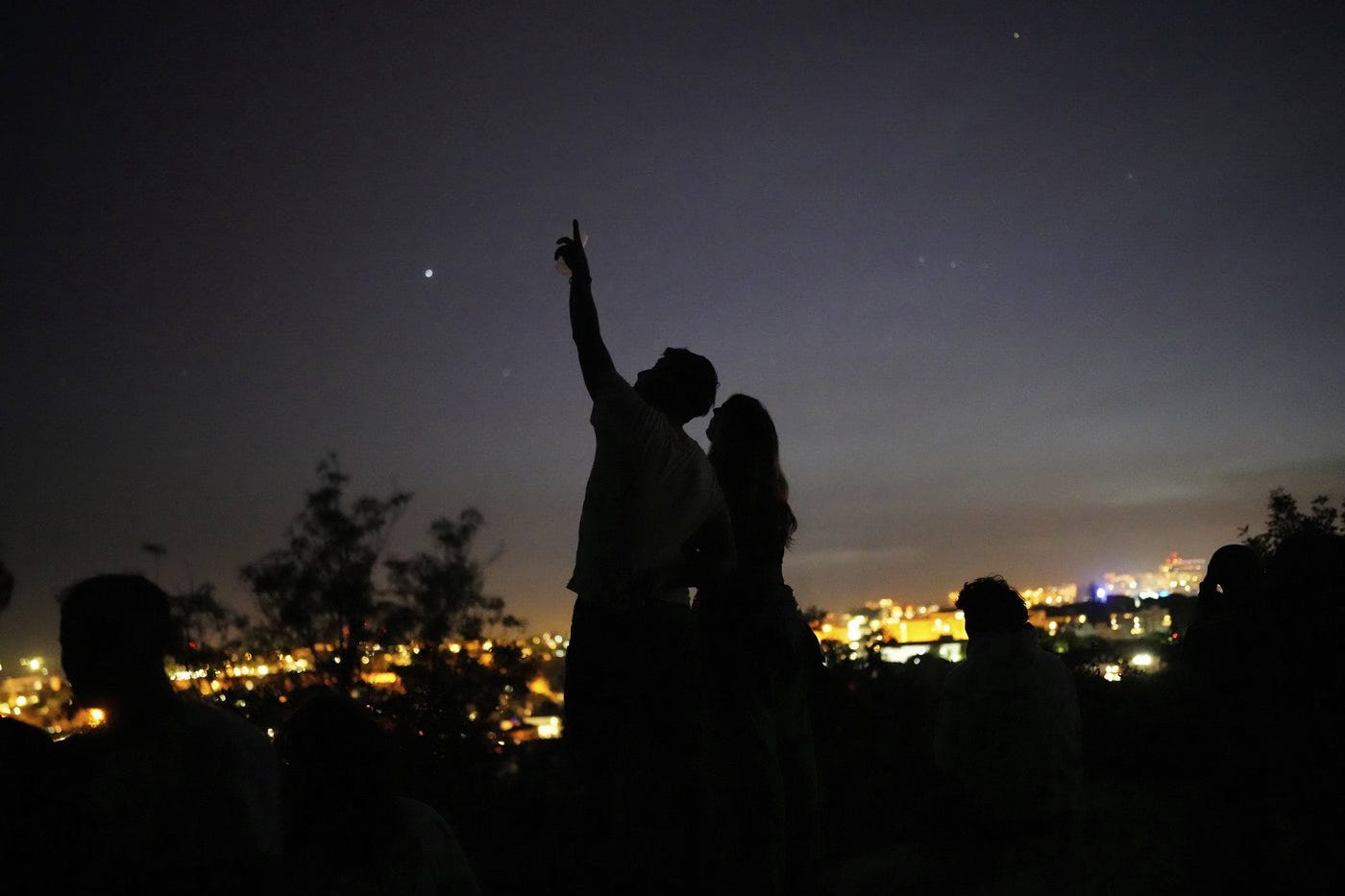
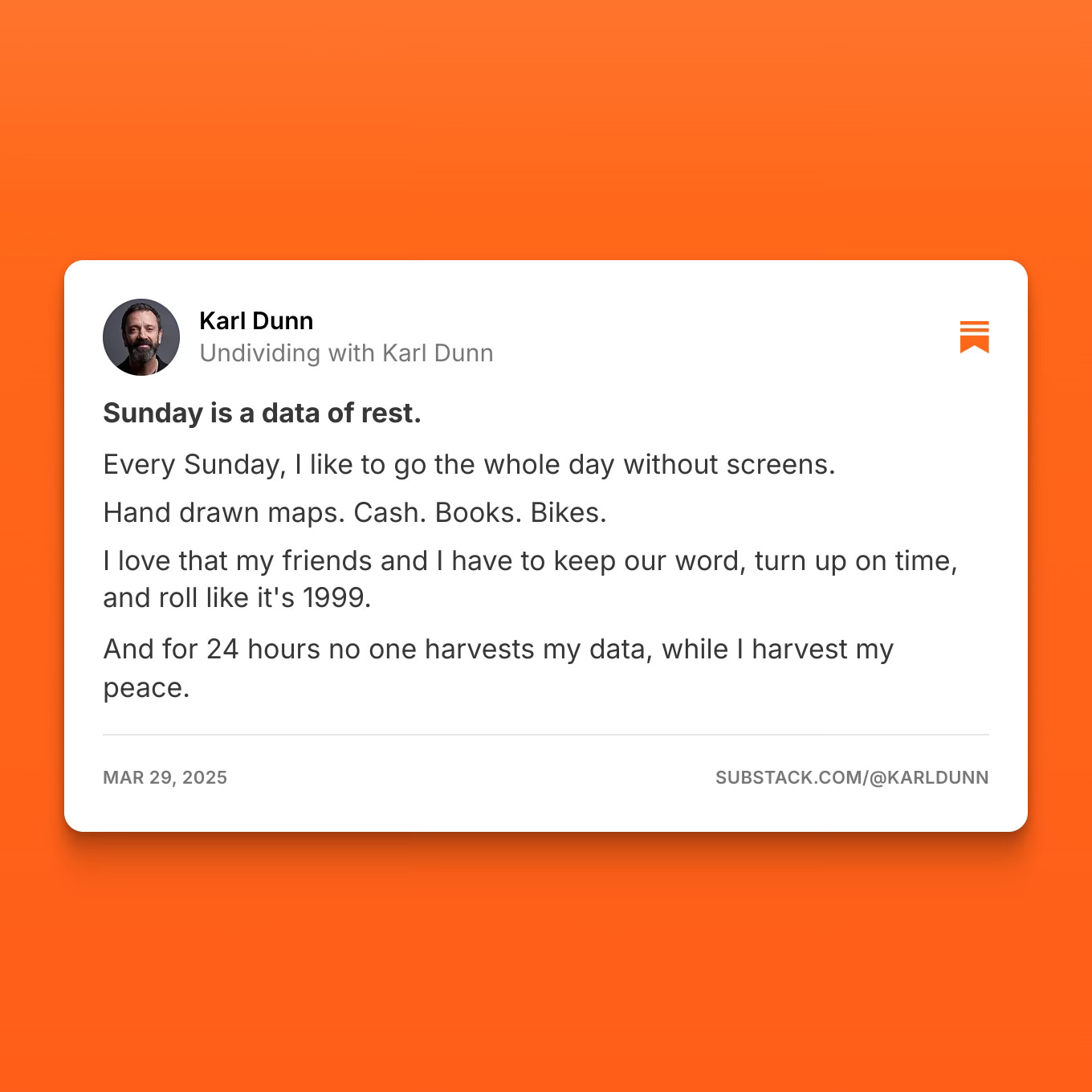
I was here in Madrid and it was great (save of course for the poor people stuck in elevators and trains for hours). People were out in the streets really living! I really wish there was one day a year at least where they turned our data off and we could just connect to each other and the world again.
Loved this thanks Karl! I live in FLA-USA and lots of this was super interesting to compare notes on our power losses, which, depending on Mother Nature, can be frequent all summer - or - not. Commonality threads which weave us all through crisis - human nature, human survival - are always interesting.
I enjoy your writing - you are one of the two 'Stacks I read each day and you always give me something good to hang onto and think about as I move through my day. Love ya! -L&B